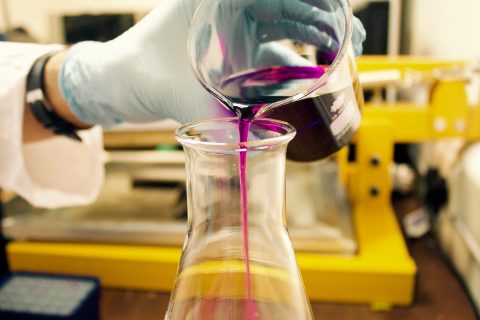Chemical Engineering (PhD)
Program overview
The PhD program in Chemical Engineering is a thesis-based program that focuses on the design of new chemical manufacturing processes and on the properties of novel materials. We train skilled engineers that find novel ways in which to solve problems that have significant impacts on everyday life, ranging from climate change to food security. Our faculty members are experts in fields such as green chemical processes, polymers and nanomaterials, new battery materials, environmental health diagnostics, and the fundamental study of the properties of materials. We place particular emphasis on developing sustainable solutions for the energy sector as well as other sectors. PhD graduates in Chemical Engineering are typically employed as consultants and research engineers in industry and government labs, or as faculty members in academia.
Program structure
Degree Requirements
Fully-qualified candidates are required to complete a minimum of 90 credits.
Please see the Engineering Courses page for course descriptions.
Chemical Engineering PhD (90 credits)
| 4 | credits of Required Course:
|
| 8 | credits chosen from the Chemical Engineering PhD Courses list. Note: Students may take a course outside the course list with permission of the Graduate Program Director. Students who take a three-credit course towards their course requirement of 12 credits must take the course to obtain the missing credit. |
| 8 | credits:
|
| 70 | credits:
|
Chemical Engineering PhD Courses (8 credits)
| | |
Students may also choose from the following Topic Areas: E37 - Environmental Engineering E52 - Thermodynamics and Heat Transfer E08 - Academic Communication Skills E09 - Professional Leadership Skills Note: Students may only select courses selected from the above Topic Areas that are not included in the Chemical Engineering MASc Core Courses list or the Chemical Engineering MASc Electives List. |
Admission requirements
Proficiency in English
Proficiency in English. Applicants whose primary language is not English must demonstrate that their knowledge of English is sufficient to pursue graduate studies in their chosen field. Please refer to the English language proficiency page for further information on requirements and exemptions.
Application process
Application deadlines

FALL
July 1 (Canadian resident)
March 1 (U.S. and international)

WINTER
November 1 (Canadian resident)
July 1 (U.S. and international)

SUMMER
March 1 (Canadian resident)
November 1 (U.S. and international)
Priority will be given to complete applications submitted by the deadline. In some cases, programs may continue to accept applications as long as there is space available.
International students: Considering the waiting period involved in meeting the entry requirements to Canada and Quebec, we strongly encourage international applicants to apply early and submit supporting documents prior to the deadline.
Tuition & funding
Tuition and fees
Tuition and fees of the program may depend on your student status, among other key factors. Estimate these costs based on the most common situations.
Awards and funding
Funding packages are generally available for students in thesis-based programs. They come in the form of awards, teaching and research assistantships are offered at the time of admission to most students to allow them to focus on their research and studies. Research and thesis-based students are automatically considered for all entrance graduate awards when they apply to Concordia, provided they meet eligibility criteria. No separate application is required.
The Quebec and Canadian governments offer a number of competitive graduate scholarships. We encourage you to apply for these awards at the same time you are preparing your application.
Other programs of interest

Build on your work as a researcher in an environment that combines chemistry, biochemistry, and physics with world-renowned faculty in areas such as bionanoscience and protein science to propel your research to the next level.
Department
Department of Chemistry and Biochemistry
Faculty

